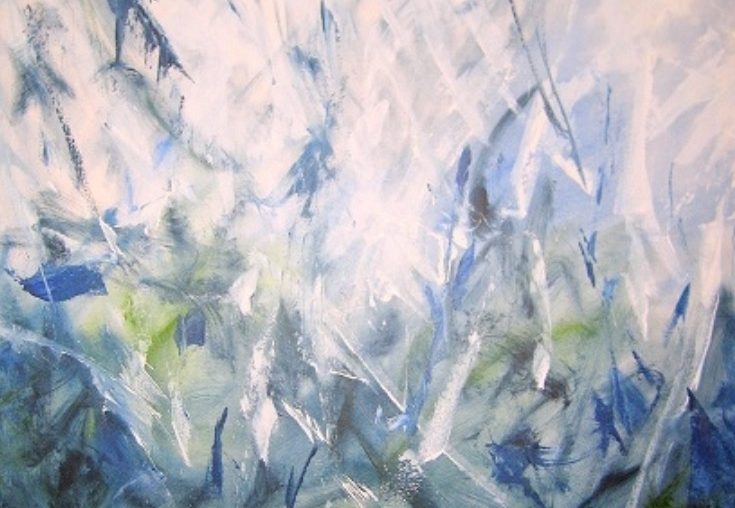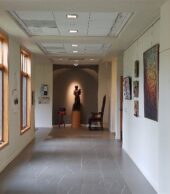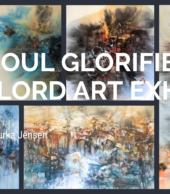Persistence, Not Perfection
Kathy Fleming is a talented visual artist (www.kflemingart.com) who serves as the Artist Coordinator for the Benedictine Center of St. Paul's Monastery. Her canvases are captivating both in their craftsmanship and the deep reflection underlying each one. Those who see the exhibits she designs in the Monastery Gallery benefit from her uncanny ability to look at a someone’s collection of artwork and find the best possible way to accent each piece while creating a sense of unity.
So imagine my surprise in a recent conversation we had about the artistic process when Kathy talked about getting better at conquering her doubt when she is in her studio and finding courage to show her work even when she senses a piece is not yet “perfect.” Perfect is not a bad word. It just fails as a standard for the process of creating art or writing. It gets in the way of taking risks, trying a new approach, or inviting someone to give feedback. Over time, the quest for perfection cultivates doubt – not in a particular piece or art or writing – but in our capacity itself.
Persistence Evidenced in Practice
I would like to argue that perfection is rare. We might see it in the Great Masters and literary geniuses, but my bet is that what makes us swoon now about their work found its way over time and with great persistence. Persistence is, of course, evidenced in practice. Kathy Fleming doesn’t go into her studio once in a rare while. There is a regularity to her work that lets her try out an idea, see if it works, and if not, take a different tact.
When I am working on a manuscript of poems, it is not uncommon for some to undergo revision fifteen or twenty times. Sometimes it is just a word or phrase; other times a whole stanza has to undergo major reconstruction. Some poems don’t survive the process. I used to fret about that, quite sure that more talented writers were able to find a workable draft with less intensive labor. However, it wasn’t talent I lacked, but attitude.
First drafts are first drafts. They capture an idea that inspired my attention. Every subsequent draft, every revision small or major, are part of the process of discovering how best I can express what inspired the original idea. My writing book is filled with rubble, poems that will never go anywhere – nor should they. But I have learned to reverence them for they have helped me be persistent in continuing to discover how to say what I see.
My work with writers in recent years largely focuses on weaning them off the hope of perfection. I try to encourage them to be better companions to their writing, paying attention to how the process and practice of writing is a source of learning. In a workshop, one of my standard rules is that a person cannot begin reading a piece they’ve written with any sort of dismissive disclaimer, e.g. “This is probably not very good.” The piece may not be finished; it may well benefit from more revision and thought. But it is on the way to what it might be.
Kathy Fleming would be the first to say that her artistic mastery is still in process. She is still learning, still battling with doubt from time to time. But her persistence – sitting before the easel and pulling the first stroke of paint down the canvas – is the only way to discover what awaits her. Her honesty inspired the following poem. It is for all of us who create in a variety of ways. Receive it as encouragement to let go of false needs for perfection. Embrace persistence and the practice it entails.
Imperfect Beauty
An artist before her canvas,
a writer at his desk,
the potter at the wheel,
actors as the curtains rise –
all know the shock of imperfection,
rushing through their bodies
like a lightening bolt.
In those moments of great doubt,
they wonder about their audacity,
weighing their faults, the gap
between their vision and their gifts.
But no artist would paint
or actor speak his first word
if they stay riveted in doubt.
The first brush stroke
or tentative lines of text
propel the artist forward.
As the wheel turns and the potter
sets her hand to the clay,
courage and curiosity unite.
What comes, hesitant at first,
emerges with a boldness even those,
accustomed to the long wait,
find startling –
the vessel taking shape,
the sonnet beginning to sing,
the community of color and stroke
revealing what’s been hidden –
too long.

Learn more about Victor Klimoski, his own writing, art as spiritual practice, and his upcoming events.






